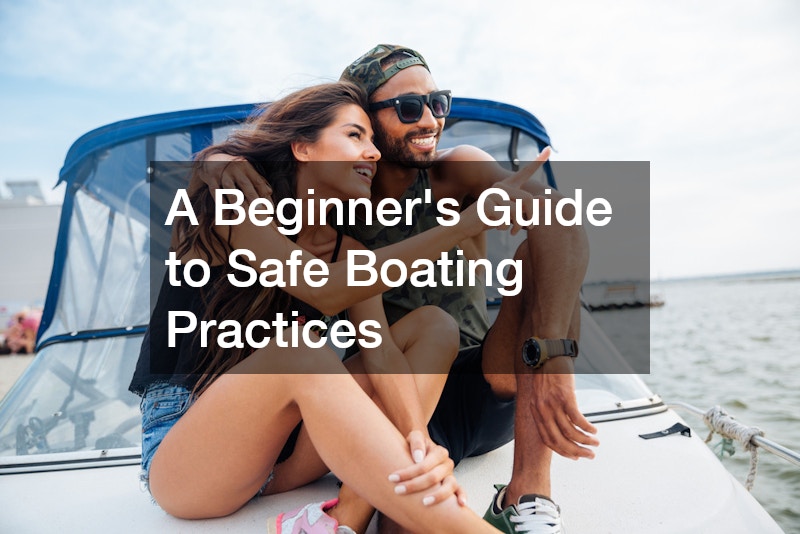
Boating can be one of the most rewarding and enjoyable pastimes, especially during the warm, sun-soaked days of summer. Whether you’re a seasoned mariner or just launching your first boat, understanding the principles of safe boating is essential. The open water can be unpredictable, and accidents can happen quickly if you’re not prepared. From proper equipment checks to understanding weather patterns, safe boating involves a combination of awareness, preparation, and common sense.
In this beginner’s guide, we’ll walk you through the fundamentals of staying safe on the water. You’ll learn about everything from navigating local waterways to choosing the right safety gear and what to do in case of an emergency. We’ll also touch on legal responsibilities, boat maintenance, and what features to look for in marine accessories. If you’re planning on launching your summer boat this season, you must be informed and confident before setting sail.
The guide is particularly valuable for families and recreational boaters who want to enjoy peaceful weekends on their favorite lakes or coastal waters. Safety not only ensures your enjoyment but also protects those around you. So let’s dive in and discover what it takes to become a smart and safe boat operator.
Learning Boating Terms and Navigational Aids
One of the first steps for new boaters is getting comfortable with essential boating terms and navigational aids. Much like learning road signs before driving, understanding the language of boating helps you operate safely and confidently. From port and starboard to bow and stern, these basic terms make communication clearer and prevent confusion on the water. Knowing the difference between “draft” and “wake,” for example, can help you avoid shallow-water mishaps and ensure smoother interactions with other boaters.
Equally important is learning boating buoys and markers meanings, which act as the traffic signals of the waterways. Buoys can indicate safe channels, mark hazards, or guide you away from restricted areas. Red and green channel markers, for instance, are critical for safe navigation and keeping your vessel within the correct lanes. Ignoring these signals could lead to running aground or colliding with underwater obstacles. By studying these markers before setting out, beginners can reduce risks and make their time on the water far more enjoyable.
Understanding the Importance of Boat Lifts
For many new boat owners, docking and storing the vessel safely can be a challenge. This is where platform boat lifts come into play. A platform boat lift provides a stable surface that raises your vessel out of the water when it’s not in use. This prevents the hull from accumulating algae, reduces corrosion, and keeps your boat in better shape long term. For anyone investing in a boat, a platform boat lift is one of the smartest accessories you can install.
Unlike traditional lifts, platform lifts offer greater stability and safety when entering or exiting the vessel. They also ease maintenance tasks, such as hull cleaning or minor repairs. These lifts are especially helpful for beginner boaters who may be uneasy about balancing on narrow docks. The wide, stable surface ensures fewer slips and falls.
In addition to enhancing safety, platform lifts also protect your boat during inclement weather. Sudden summer storms can wreak havoc on docked boats, and a reliable lift minimizes exposure to waves and debris. Whether you’re storing a fishing boat or a luxury cruiser, this equipment is indispensable. If you’re serious about maintaining your summer boat for years to come, incorporating a platform boat lift into your setup is a smart investment.
Choosing the Best Boat Lifts
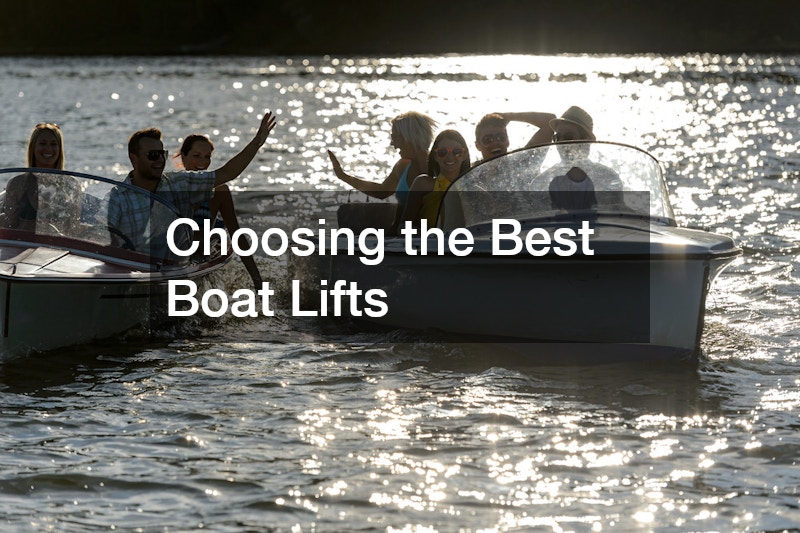
Before you can enjoy the open water, it’s important to think about how you’re going to store your boat when it’s not in use. There are many boat lifts for sale, ranging in size, capability, and design. As a beginner, choosing the right lift might seem overwhelming, but understanding a few basics can guide your decision.
First, consider the size and weight of your boat. A lift must support your vessel without strain. Hydraulic lifts are ideal for larger, heavier boats, while manual or electric lifts may suffice for smaller crafts. The material also matters—aluminum lifts resist corrosion and are lightweight, whereas steel options are sturdier but more susceptible to rust if not properly maintained.
Another key factor is your dock setup. Some lifts are compatible with floating docks, while others are suited for fixed piers. Make sure to measure your space and talk to dock experts before making a purchase. Investing in a quality lift ensures longevity and fewer complications when docking your boat.
Don’t forget to ask about warranties, ease of installation, and manufacturer support. Buying the right boat lift means more time spent enjoying the water and less time worrying about storage and safety issues.
Safely Towing Your Boat: Finding the Right Hitch to Tow
Transporting your boat safely begins with selecting the proper hitch to tow with. Your tow vehicle’s hitch is the crucial link between land and water, and selecting the wrong one can lead to serious safety hazards. As a new boater, it’s essential to understand towing capacity, hitch types, and proper weight distribution before hitting the road.
A Class III or higher hitch is generally suitable for most recreational boats. However, you should verify your vehicle’s Gross Trailer Weight (GTW) and Tongue Weight (TW) capacities to ensure compatibility. Improper matching can cause instability, swaying, or even loss of control.
Weight distribution hitches are a great investment if you’re towing a heavier boat. They help level your tow vehicle and trailer, improving handling and braking. Anti-sway mechanisms can add another layer of safety, especially during long highway drives or in windy conditions.
Don’t overlook the importance of safety chains, trailer lights, and brake controllers. Before every trip, double-check that your hitch is secure and your trailer lights are functioning. Practicing safe towing isn’t just about getting your boat to the water—it’s about making sure everyone gets there in one piece.
How a Truck Cover Can Help With Boating Preparation
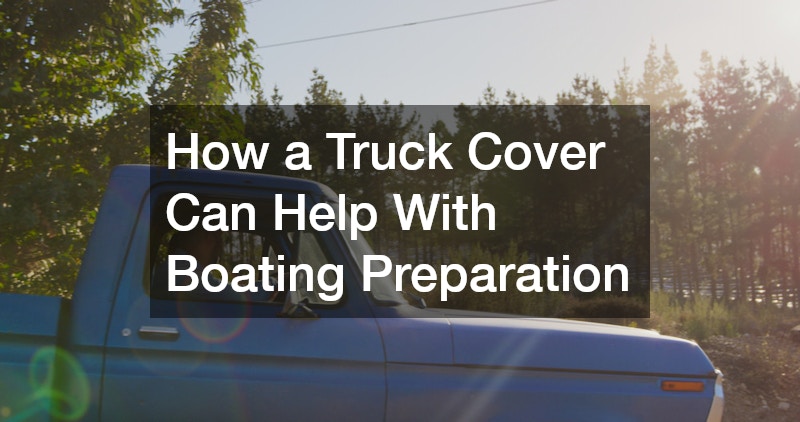
While the boat and trailer get the most attention, your tow vehicle’s setup plays a vital supporting role. One of the most useful accessories you can invest in is a bed cover. Whether you’re hauling life jackets, fishing gear, coolers, or electronics, a truck bed cover offers protection from the elements and theft, especially during extended summer boat excursions.
A quality bed cover helps organize your boating equipment and keeps it secure during travel. Hard covers provide robust protection and security, while soft roll-up covers offer flexibility and easy access. Waterproof and UV-resistant materials are a must if you’re carrying gear that shouldn’t get wet or sun-damaged.
Additionally, a cover helps reduce wind drag, improving fuel efficiency on the way to your boating destination. It also prevents items from flying out of the bed at high speeds, a surprisingly common and dangerous problem among new boaters.
Keeping your gear dry and secure can make the difference between a relaxing day on your summer boat and a stressful one spent replacing lost or damaged items. A bed cover ensures that your boating essentials arrive safely and are ready when you are.
What to Do If You Need Collision Repair After an Accident
Even with the best precautions, boating accidents can happen. If your trailer, boat, or tow vehicle sustains damage, finding a reputable collision repair shop is essential. Many beginner boaters underestimate how much damage can occur during launch, retrieval, or towing. A minor misjudgment at the dock or a sudden stop on the road can result in dents, cracked fiberglass, or worse.
Look for repair shops that specialize in marine or trailer-related repairs. These facilities are better equipped to handle the unique structural and cosmetic needs of boats and towing vehicles. Whether you’ve scraped a fender or need fiberglass work on your hull, skilled technicians will assess the damage and provide a comprehensive repair plan.
Documentation is key. Be sure to take photos and gather insurance information immediately after any incident. A reliable repair shop will also assist you in working with insurers to expedite the claims process.
Accidents can be disheartening, especially if they occur during your first summer boat outing. However, knowing you have access to professional repair services will get you back on the water sooner and with greater confidence.
Staying on Top of Routine Repairs for Towing Reliability
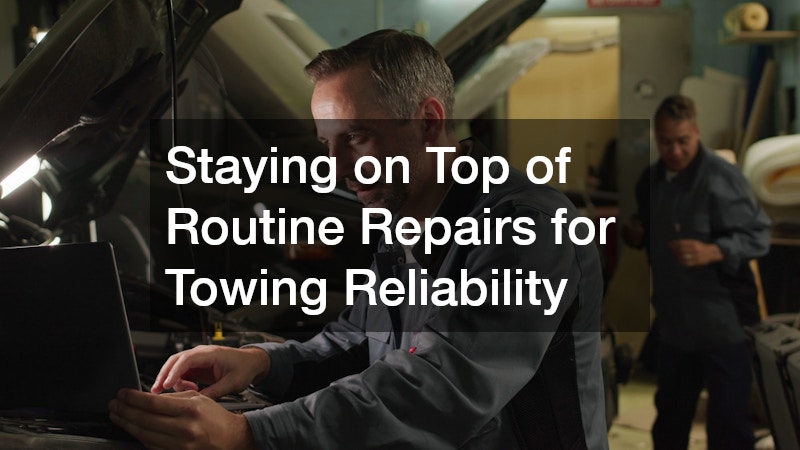
Reliable towing isn’t just about your hitch—it starts with your vehicle’s health. Staying current on auto repairs is critical to ensuring safe boat transportation. Your engine, brakes, tires, and suspension all endure extra strain when pulling a trailer. Ignoring maintenance can lead to breakdowns, accidents, or costly delays.
Before the boating season begins, have a certified mechanic inspect your tow vehicle. Pay special attention to the brakes, transmission fluid, cooling system, and tires. Worn brake pads or overheated engines can spell disaster when you’re hauling a summer boat to the lake.
Regular oil changes, tire rotations, and fluid checks will keep your vehicle operating efficiently and safely under load. If you’re planning multiple boating trips throughout the season, schedule a mid-season checkup to catch any developing issues early.
Simple repairs now can prevent major problems down the line. Whether you’re heading out for a weekend or a longer adventure, a well-maintained vehicle ensures your summer boat arrives safely at your destination—and gets back home just as easily.
Understanding Your Rights: Hurricane Attorneys Can Help
In coastal regions, hurricanes and tropical storms are a real concern for boat owners. If your vessel sustains storm damage, hurricane damage attorneys can be a valuable resource. Many insurance claims are denied due to loopholes, poor documentation, or ambiguous policy language. That’s where experienced attorneys step in.
These legal professionals specialize in helping boat owners navigate complex claims related to dock destruction, hull damage, or total loss. Whether your summer boat is stored in a marina or secured at home, it’s still at risk from high winds, flooding, and debris.
Hurricane attorneys will review your insurance policy, inspect damage reports, and negotiate with insurers on your behalf. Their expertise can mean the difference between a denied claim and a fair settlement. Don’t wait until disaster strikes—understand your coverage now and know who to call if you need help.
After a storm, your first step should be documenting all damage and contacting your insurer. If things become contentious, having a skilled attorney on your side ensures your interests are protected. Peace of mind is invaluable when it comes to your prized boat.
When to Consult an Attorney After a Boating Accident
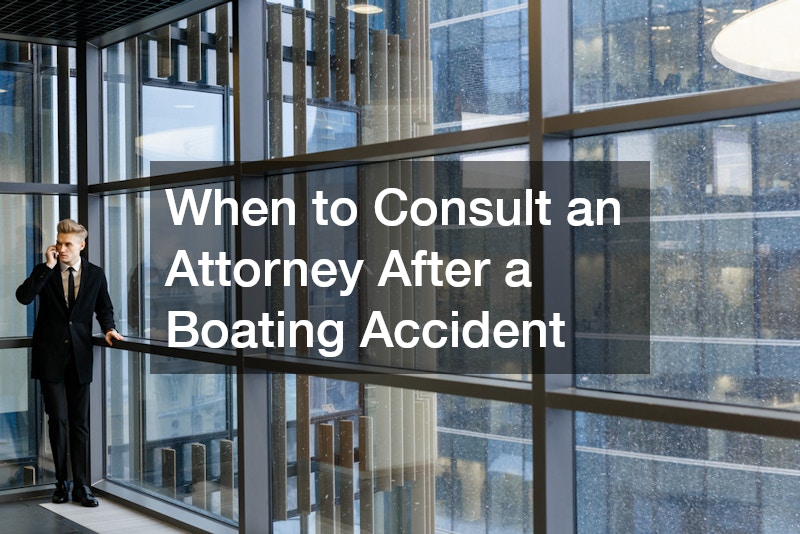
Boating is fun, but it also comes with risks. If you or a loved one is injured due to another person’s negligence on the water, you may need to contact an injury attorney. These legal professionals specialize in maritime law and personal injury claims involving boat collisions, slip-and-falls on docks, or injuries from unsafe boating practices.
An attorney can help you recover compensation for medical expenses, lost wages, and emotional distress. They’ll investigate the incident, gather evidence, and determine liability. In many cases, boating accidents involve inexperienced operators or impaired driving, both of which are prosecutable offenses.
If your summer boat outing turns into a trip to the emergency room, it’s important to know your rights. Don’t accept any settlement or agreement without speaking to an attorney first. Document your injuries, keep all medical records, and contact legal counsel as soon as possible.
A single accident can have lasting consequences. The right attorney ensures you’re not left bearing the financial burden for someone else’s mistake. Safe boating starts with preparation, but if things go wrong, legal support can help you find justice.
Partnering With a Company for Safe Storage
Choosing the right dock for your boat isn’t just a matter of convenience—it’s a matter of safety. Reputable dock companies offer a range of solutions tailored to your boat’s size, local water conditions, and storage needs. From floating docks to fixed piers, these professionals can help you install a setup that minimizes hazards and simplifies boarding.
Beginner boaters often struggle with improper docking techniques, which can result in damage or injury. A company can design layouts with bumpers, cleats, and safe walking areas that cater specifically to novice users. They’ll also ensure the structure complies with local safety codes and environmental regulations.
A well-built dock improves your boat experience by making launching and landing safer and faster. It also reduces wear and tear on your vessel, especially during changing tides or storms. Working with professionals ensures your investment is protected long term.
Don’t cut corners when it comes to docking. The right company will assess your property, recommend materials, and install a solution that keeps your boat—and your family—safe every time you come ashore.
Why Leveling Matters for Safe and Smooth Access
One of the often-overlooked components of dock safety is proper leveling. Uneven or improperly installed docks can pose significant hazards to boaters, especially beginners. A dock that is too high or too low in relation to your boat can make boarding difficult, and during stormy conditions or fluctuating water levels, this imbalance becomes even more dangerous.
Dock leveling solutions ensure that your dock surface remains even and aligned with your boat, no matter the water conditions. Adjustable dock legs, floats, and hydraulic mechanisms can all contribute to a level, secure docking experience. For those storing their summer boat at a personal residence or private marina, investing in adjustable systems can greatly enhance safety.
Slips and falls are among the most common boating-related injuries, and many happen on or around docks. Ensuring your dock is level and structurally sound minimizes these risks. It also simplifies the process of loading and unloading your boat with supplies, passengers, or gear.
Regular maintenance and inspection of dock components should be part of your seasonal checklist. A level dock creates peace of mind and allows everyone to enjoy the boating experience with greater ease and confidence.
Embrace Safe Boating for a Lifetime of Enjoyment
Safe boating isn’t just a checklist—it’s a mindset. As a beginner, you’re laying the foundation for a lifetime of enjoyable water adventures. By investing in the right equipment like boat lifts, ensuring proper repairs, and learning from seasoned professionals like a company and attorney, you’re setting yourself up for success.
Each boat outing is a chance to apply what you’ve learned and gain confidence as a responsible operator. Remember, preparation is key: from choosing the right hitch to tow with, to understanding hurricane-related risks and when to call a repair shop, every step matters.
This guide offers a roadmap for safer, smarter boating. By practicing the techniques and insights discussed—from leveling to bed cover use—you reduce risk, increase comfort, and maximize enjoyment. Your boat should be a source of fun, not frustration or danger.
Make safety your first priority and let your passion for boating flourish. Whether you’re exploring local lakes or cruising the coast, safe practices ensure your boat brings joy to you and your loved ones for many seasons to come.
